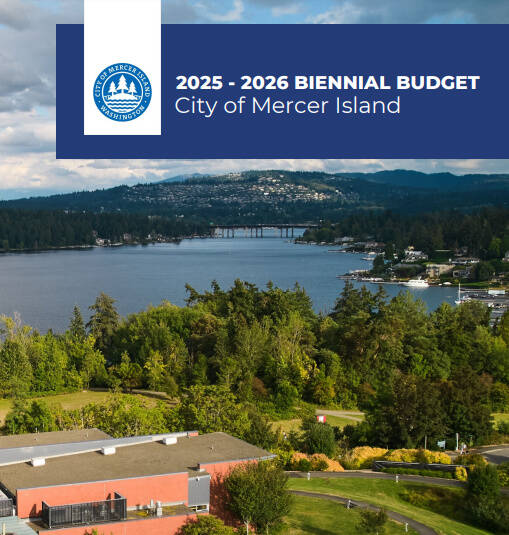Mercer Island residents can now peruse the city’s final 2025-2026 biennial budget, which city council adopted at its Dec. 3 regular meeting last year.
The final 309-page budget is available for viewing at www.mercerisland.gov/budget. At the Dec. 3 meeting, council didn’t make any amendments to the preliminary budget that it received last fall.
According to the budget, the estimated 2025-26 revenues are $225,057,989 and estimated 2025-2026 expenditures are $221,952,921.
On the revenue front, the subtotal general purpose funds amount is an estimated $76,466,381; in the expenditure realm, the subtotal general purpose funds amount is an estimated $75,930,257.
Estimated revenue and expenditure totals in key sections are of the exact amount for the capital improvement fund ($20,437,481), water fund ($48,122,996), sewer fund ($31,456,238), street fund ($10,398,798) and Firefighters Pension Fund ($282,000). There are slight revenue and expenditure monetary differences in the technology and equipment fund, development services fund and others. Residents can view the budget for a complete rundown of monetary figures.
Within the budget, it is stated that “the city has issued a modest amount of debt over the years, maintaining a sizable debt capacity and consistently following a conservative fiscal management policy.” Moody’s Ratings affirms the city’s Aaa credit rating, the highest possible credit rating for a local government, the city said in an earlier Reporter article.
In the non-voted debt realm, the budget notes that the total principal outstanding at the end of 2026 on the 2011 issuance of $1.5 million in LTGO (Limited Tax General Obligation) bonds for First Hill water improvements will be $395,000; the total principal outstanding at the end of 2026 on a nine-year lease purchase financing agreement for a fire department enforcer pumper will be $93,500 (the purchase cost in 2018 was $732,778); and there are other active issues with water system improvements and Public Work Trust Fund loans.
“In spite of unprecedented cost increases in this volatile market, we’ve passed a balanced budget that will serve Mercer Island well,” said Mayor Salim Nice in a previous Reporter story.
During a past council meeting, City Manager Jessi Bon said that the Island’s highest priorities for the next two years will touch upon future facility needs, water, sewer, stormwater, streets, parks capital projects and more.
Bon noted in her budget lead-off message: “The biennial budget supports everything we do at the city. It’s built upon significant progress and a sustained practice to enhance city services and operations with each biennium. City staff is committed to carrying out the city council’s direction encompassed in the budget.”
The six-section document features a budget overview, recap by fund, revenue sources, operating budget by department, Capital Improvement Program (CIP) and more.
In the parks, recreation and open space orbit, the budget delves into Aubrey Davis Park outdoor gallery improvements, backstop replacement, vegetation management and more; Clarke Beach and Groveland Beach Park waterfront improvements; Luther Burbank Park dock, waterfront and swim beach improvements along with the boiler building renovation phase two project; Mercer Island Community and Event Center (MICEC) parking lot improvements and playground replacement and a multitude of other citywide projects.
On the streets, pedestrian and bicycle facilities front, there’s Island Crest Way corridor improvements, a pedestrian and bicycle facilities plan implementation, Gallagher Hill Road overlay and sidewalk improvements, Town Center long-term regional transit commuter parking project and more.
In the government buildings realm, there’s MICEC HVAC replacement, ground water intrusion and more; Thrift Shop facility repairs; city hall operational contingency; Public Works building safety/continued occupancy and more projects.
According to the city website, the most crucial aspect of the budget is that, “it is a detailed description of the goods and services for which the city and its elected officials will be held accountable. It documents the ‘social contract’ between the community and their government.”


